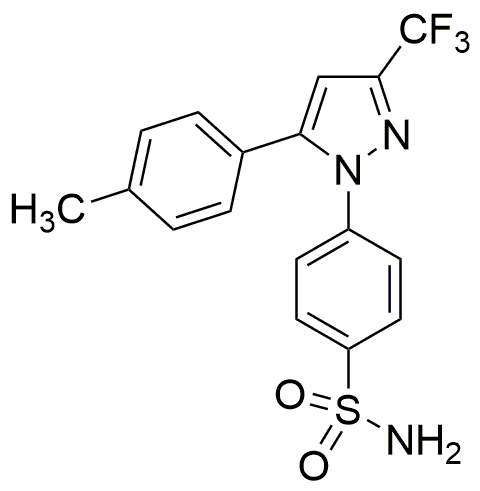Celecoxib is widely utilized in research focused on:
- Pain Management: Commonly prescribed for conditions like arthritis, Celecoxib effectively reduces inflammation and pain, providing relief for patients suffering from chronic pain conditions.
- Cardiovascular Research: Its selective inhibition of COX-2 makes it a key compound in studies exploring the cardiovascular effects of non-steroidal anti-inflammatory drugs (NSAIDs), helping researchers understand safer pain relief options.
- Cancer Treatment Studies: Celecoxib is being investigated for its potential role in cancer therapy, particularly in colorectal cancer, due to its ability to inhibit tumor growth and promote apoptosis in cancer cells.
- Postoperative Pain Relief: In surgical settings, Celecoxib is used to manage postoperative pain, offering an alternative to traditional opioids, which can reduce the risk of dependency and side effects.
- Research on Gastrointestinal Safety: Compared to other NSAIDs, Celecoxib is associated with a lower risk of gastrointestinal complications, making it a valuable subject in studies aimed at improving patient safety in pain management.
General Information
Properties
Safety and Regulations
Applications
Celecoxib is widely utilized in research focused on:
- Pain Management: Commonly prescribed for conditions like arthritis, Celecoxib effectively reduces inflammation and pain, providing relief for patients suffering from chronic pain conditions.
- Cardiovascular Research: Its selective inhibition of COX-2 makes it a key compound in studies exploring the cardiovascular effects of non-steroidal anti-inflammatory drugs (NSAIDs), helping researchers understand safer pain relief options.
- Cancer Treatment Studies: Celecoxib is being investigated for its potential role in cancer therapy, particularly in colorectal cancer, due to its ability to inhibit tumor growth and promote apoptosis in cancer cells.
- Postoperative Pain Relief: In surgical settings, Celecoxib is used to manage postoperative pain, offering an alternative to traditional opioids, which can reduce the risk of dependency and side effects.
- Research on Gastrointestinal Safety: Compared to other NSAIDs, Celecoxib is associated with a lower risk of gastrointestinal complications, making it a valuable subject in studies aimed at improving patient safety in pain management.
Documents
Safety Data Sheets (SDS)
The SDS provides comprehensive safety information on handling, storage, and disposal of the product.
Product Specification (PS)
The PS provides a comprehensive breakdown of the product’s properties, including chemical composition, physical state, purity, and storage requirements. It also details acceptable quality ranges and the product's intended applications.
Certificates of Analysis (COA)
Search for Certificates of Analysis (COA) by entering the products Lot Number. Lot and Batch Numbers can be found on a product’s label following the words ‘Lot’ or ‘Batch’.
*Catalog Number
*Lot Number
Certificates Of Origin (COO)
This COO confirms the country where the product was manufactured, and also details the materials and components used in it and whether it is derived from natural, synthetic, or other specific sources. This certificate may be required for customs, trade, and regulatory compliance.
*Catalog Number
*Lot Number
Safety Data Sheets (SDS)
The SDS provides comprehensive safety information on handling, storage, and disposal of the product.
DownloadProduct Specification (PS)
The PS provides a comprehensive breakdown of the product’s properties, including chemical composition, physical state, purity, and storage requirements. It also details acceptable quality ranges and the product's intended applications.
DownloadCertificates of Analysis (COA)
Search for Certificates of Analysis (COA) by entering the products Lot Number. Lot and Batch Numbers can be found on a product’s label following the words ‘Lot’ or ‘Batch’.
*Catalog Number
*Lot Number
Certificates Of Origin (COO)
This COO confirms the country where the product was manufactured, and also details the materials and components used in it and whether it is derived from natural, synthetic, or other specific sources. This certificate may be required for customs, trade, and regulatory compliance.


